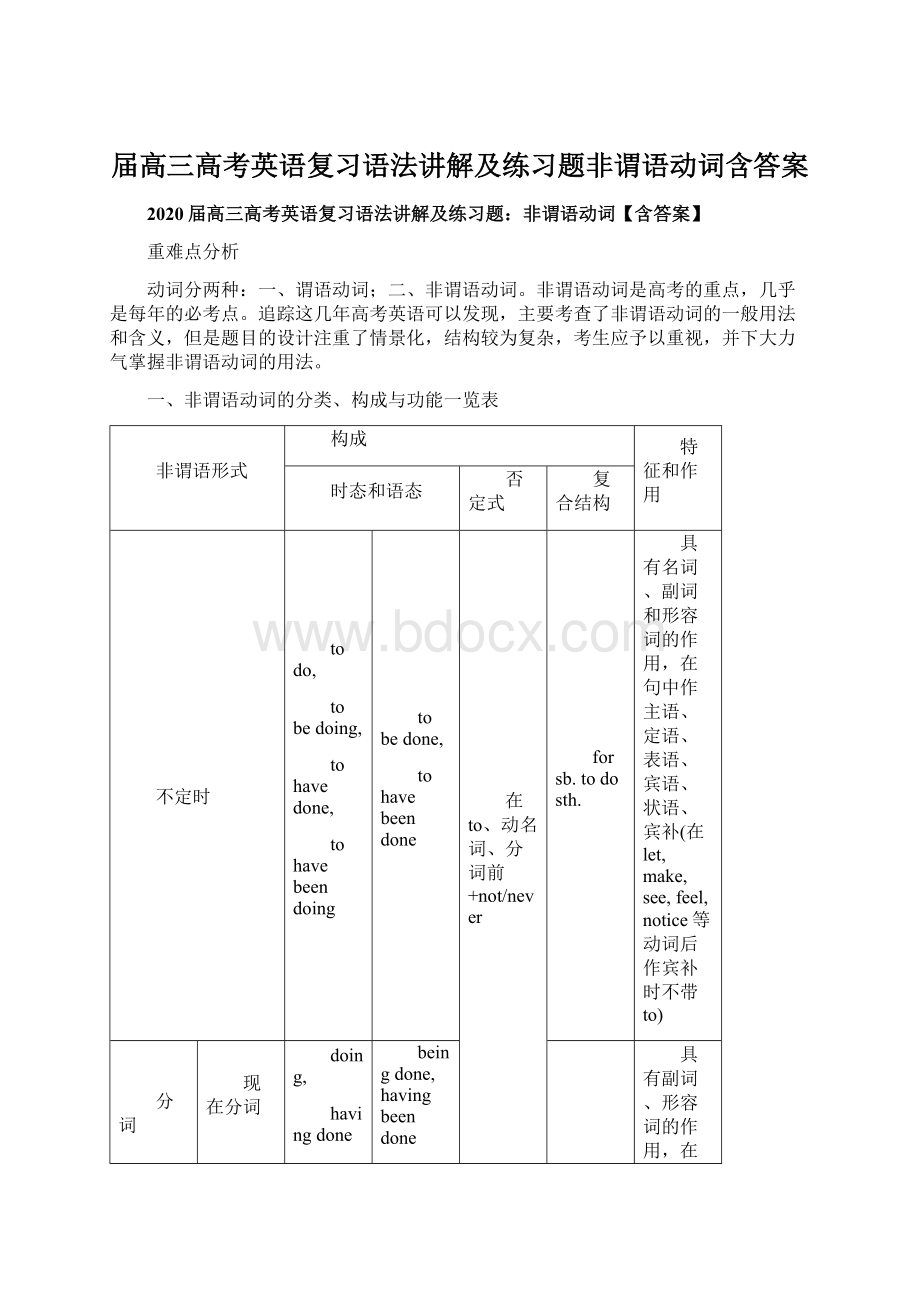 届高三高考英语复习语法讲解及练习题非谓语动词含答案.docx
届高三高考英语复习语法讲解及练习题非谓语动词含答案.docx
- 文档编号:3369475
- 上传时间:2022-11-22
- 格式:DOCX
- 页数:10
- 大小:22.32KB
届高三高考英语复习语法讲解及练习题非谓语动词含答案.docx
《届高三高考英语复习语法讲解及练习题非谓语动词含答案.docx》由会员分享,可在线阅读,更多相关《届高三高考英语复习语法讲解及练习题非谓语动词含答案.docx(10页珍藏版)》请在冰豆网上搜索。

届高三高考英语复习语法讲解及练习题非谓语动词含答案
2020届高三高考英语复习语法讲解及练习题:
非谓语动词【含答案】
重难点分析
动词分两种:
一、谓语动词;二、非谓语动词。
非谓语动词是高考的重点,几乎是每年的必考点。
追踪这几年高考英语可以发现,主要考查了非谓语动词的一般用法和含义,但是题目的设计注重了情景化,结构较为复杂,考生应予以重视,并下大力气掌握非谓语动词的用法。
一、非谓语动词的分类、构成与功能一览表
非谓语形式
构成
特征和作用
时态和语态
否定式
复合结构
不定时
todo,
tobedoing,
tohavedone,
tohavebeendoing
tobedone,
tohavebeendone
在to、动名词、分词前+not/never
forsb.todosth.
具有名词、副词和形容词的作用,在句中作主语、定语、表语、宾语、状语、宾补(在let,make,see,feel,notice等动词后作宾补时不带to)
分词
现在分词
doing,
havingdone
beingdone,havingbeendone
具有副词、形容词的作用,在句中作定语、表语、状语、宾补(常用在see,find,feel,keep,get,have等动词之后)
过去分词
done
动名词
doing,
havingdone
beingdone,havingbeendone
sb.’sdoing
具有名词的作用,在句中作主语、定语、表语、宾语
二、作宾语的非谓语动词比较
情况
常用动词
只接不定式作宾语的动词或短语
hope,offer,long,fail,expect,wish,ask,decide,pretend,manage,agree,afford,determine,promise,happen
wouldlike,takesteps/measures/actions,makeupone’smind,tryone’sbest,makeeffortsto
只接动名词作宾语的动词或短语
mind,miss,enjoy,imagine,practise,suggest,finish,escape,excuse,appreciate,admit,prevent,keep,avoid,risk,resist,consider
feellike,succeedin,befondof,objectto,getdownto,beengagedin,insiston,thinkof,beproudof,takepridein,setabout,betiredof,lookforwardto,devoteoneselfto,beworth,bebusy,payattentionto,stickto,adaptto
两
者
都
可
以
意义基本相同
begin,start,like,love,hate,prefer,continue(接不定式多指具体的动作,接动名词多指一般或习惯行为)
need,want,allow,require(接动名词主动形式是表示被动意义,若接不定式则应用被动形式)
意义相反
stoptodo停止做手中的事,去做另外一件事stopdoing停止正在做的事
意义不同
remember/forget/regrettodo(指动作尚未发生);remember/forget/regretdoing(指动作已经发生)
goontodo(接着做另外一件事)
goondoing(接着做同一件事)
trytodo(设法;努力去做)
trydoing(试着做)
meantodo(打算做;企图做)
meandoing(意思是;意味着)
can’thelp(to)do(不能帮忙做)can’thelpdoing忍不住/禁不住要做
三、非谓语动词作宾语补足语的区别
类别
常见动词
与宾语的逻辑关系及时间概念
例句
不定式
ask,beg,expect,get,order,tell,want,wish,encourage(接带to的不定式)
主谓关系;强调动作将发生或已经完成
Iexpectthemtowinthegame.
have,notice,see,watch,hear,feel,let,make,observe,listento(接不带to的不定式)
Iheardhimcallmeseveraltimes.
现在
分词
notice,see,watch,hear,find,keep,have,feel,observe,catch(即:
感官动词和使役动词)
主谓关系;强调动作正在进行,尚未完成
Ifoundherlisteningtotheradio.
过去
分词
动宾关系;动作已经完成,多强调状态
Wefoundthevillagegreatlychanged.
四、现在分词和过去分词的用法对比
分类
项目
现在分词
过去分词
例句
意义
表示主动意义
表示被动意义
Icanhearhimsinging.
IcanhearthesongsunginEnglish.
动作
所表示的动作一般在进行中
所表示的动作已完成
ChinaisadevelopingcountrywhileAmericaisadevelopedone.
语义
意思为“令人……”
意思为“感到……”
Itisanexcitingmatch,soweareexcited.
五、特别提示
1.关于不定式
(1)不定式作介词宾语时,如前面有实义动词do(各种形式),则不定式不带to;否则不能省略to。
如:
HedidnothingallthemorningbutwatchTV.一早上他啥都没做,就看电视了。
Hesaidnothingbuttosleep.他什么都没说就睡觉了。
(2)不定式作定语时,如果不定式与所修饰的名词有逻辑上的动宾关系,且不定式的动词是不及物动词,介词不能省略。
如:
Iwantasmallroomtolivein.我想住小房间。
Ineedanicepentowritewith.我需要一支好用的笔写字。
(3)不定式作感官动词和部分使役动词(let,make)的宾补,动词不定式不带to,但句子变成被动语态时,要带to。
如:
Isawhimgointotheroom.→Hewasseentogointotheroom.我看见他进了房间。
2.关于分词
(1)现在分词作补语表示动作正在进行,不定式作补语表示动作发生的全过程。
如:
Isawhimwalkingacrosstheroad.(正在穿过马路)我看到他正在过马路。
Isawhimwalkacrosstheroad.(看到全过程,过了马路了)我看到他过了马路。
(2)及物动词的过去分词(done)与现在分词的一般被动式(beingdone)都有被动意义,前者表示动作完成,后者表示动作正在进行。
如:
Thepicturefixedonthewallwaspresentedbyafriend.(已经被订在墙上了)订在墙上的画是一个朋友送的。
Thepicturebeingfixedonthewallwaspresentedbyafriend.(正被订在墙上)正在往墙上订的画是一个朋友送的。
注意:
不定式有表将来之意。
如:
Thepicturetobefixedonthewallwaspresentedbyafriend.(将要被订在墙上)将要订在墙上的画是一个朋友送的。
(3)分词的独立主格结构:
如果分词短语的逻辑主语与句子的主语不一致,需用一个独立结构(即保留分词的逻辑主语)或者由一个with/without引导的介词短语表达。
如:
Timepermitting,wewilldoanothertwoexercises.时间允许,我们将再做两个练习。
Hisworkfinished,hepreparedtogohome.=Withhisworkfinished,hepreparedtogohome.完成工作后他准备回家。
3.关于动名词
(1)动名词作定语表所修饰词的用途;而现在分词表动作或状态、特征。
(2)动名词的复合结构作宾语,动名词的逻辑主语可用宾格代词或不带所有格。
但作主语不行。
如:
Doyoumindme/Tomsmokinghere?
你介意我/汤姆在这儿吸烟吗?
My/Tom’ssmokinghereannoyedhim.我/汤姆在这儿吸烟让他很恼怒。
(3)动名词作主语还可用于“Therebeno+动名词”结构和布告形式的省略结构中。
如:
Thereisnoknowingwhathewilldonext.不知道他下一步会做什么。
Thereisnodenyingthefactthatchildrenaremoreactive.不可否认,小孩子更好动。
Nosmoking.禁止吸烟。
考点练透
一、单句填空用每题括号中所给动词的适当形式填空。
1.
(1)___________totheleft,andyouwillseethebusstop.
(2)___________totheleft,youwillseethebusstop.(turn)
2.
(1)___________manytimes,hestillcouldn’tunderstandthequestion.
(2)___________methebadnews,hewentoutoftheroomsadly.(tell)
3.
(1)Nothingcouldmakeus___________upthehope.
(2)Crusoemadeacandle___________light.(give)
4.
(1)Iwant___________yourbag.
(2)Youreyeswant___________.
(3)Iwantmyeyes___________thisafternoon.(examine)
5.
(1)What’sthewayMr.Smiththoughtof___________enoughmoneytobuythenewhouse?
(2)Iamthinkingof___________Tomtorepairmybike.(get)
6.
(1)Wedon’tallow___________intheofficebecauseofthepublichealth.
(2)Wedon’tallowanyone___________intheofficebecauseofthepublichealth.(smoke)
7.
(1)Mylittlebrotherenjoysnothingbut___________tomusic.
(2)Mylittlebrotherdoesnothingalldaybut___________tomusic.
(3)Mylittlebrotherhadnochoicebut___________tome.(listen)
8.
(1)Theteacherraisedhisvoiceinordertomakehimself___________.
(2)Theteacherraisedhisvoiceinordertomakehisstudents___________whathesaid.
(3)ThechildrentalkedsoloudlyatdinnertablethatIhadtostruggle___________.(hear)
9.
(1)Theproblemisworth___________again.
(2)Theproblemisworthy___________again.
(3)Theproblemisworthyof___________.(discuss)
10.
(1)Thesap(汁液)passesrightthroughtheirbodies,only___________(get)alittlethickerandsweeter.
(2)Heworkedharderonly___________(fail)again.
11.
(1)Noonecanstopus___________questions.
(2)Westopped___________aschoolboythewaytotheteachers’office.(ask)
12.
(1)___________withsomuchtrouble,wefailedtocompletethetaskontime.
(2)NearlyeverygreatbuildinginBeijingwasbuilt___________south.(face)
13.
(1)Theparents’meeting___________nextSaturdayisveryimportant.
(2)The29thOlympicGames___________inBeijingwasagreatsuccess.
(3)Theparents’meeting___________inourschoolnowisimportant.(hold)
14.
(1)___________thiscake,youneed2eggs,175gsugarand175gflour.
(2)___________thecake,shegotdowntocookingsomemilk.
(3)Ilostmywayincompletedarknessand,___________mattersworse,itbegantorain.(make)
15.
(1)TheroomissodirtythatIcan’thelp___________it.
(2)Iamtoobusy,soIcan’thelp___________theroom.
(3)Theroomistoodirty.Ican’thelpbut___________it.(clean)
16.
(1)IknewIwouldbebusytoday,soIhadmypaper___________lastnight.
(2)Ican’tgowithyou.Ihavesomepapers___________.
(3)Doyouhaveanypapers___________,sir?
(type)
17.
(1)Withmanyproblems___________,thepresidentwillhaveahardtime.
(2)Withtheproblem___________,hehadagoodsleeplastnight.
(3)Withthesecretary___________theproblem,heisreadingthenewspaperleisurelyintheoffice.(settle)
18.
(1)“Ieversawhim___________anoldmanof500yuan,”hesaidtothepolice.
(2)Hewasseen___________anoldmanof500yuaninthestreetyesterday.
(3)Unluckily,thepolicemansawhim___________anoldmanaroundthecorner.(cheat)
19.Thefilmwas___________andallofuswerevery___________.(disappoint)
20.Atthebeginningofclass,thenoiseofdesks___________(openandclose)couldbeheardoutsidetheclassroom.
二、语篇填空用括号中所给词的适当形式填空。
____1____(fall)inlovewithabeautifulgirl,alionwenttoherparentsandaskedthem____2____(marry)hertohim.
Theoldparentsdidnotknowwhattosay.
Not____3____(like)theideaofgivingtheirdaughtertothelion,theydidnotwant____4____(anger)thekingofbeasts.
Atlastthefathersaid,“Weareasgladasotherparents____5____(marry)ourdaughtertoyou,butwefearthatyoumightpossiblyhurther.So____6____(remove)yourclawsandteeth,youcanmarryher.”
____7____(love)thegirlverymuch,theliontrimmed(修剪)hisclawsandtookouthisbigteeth.____8____(come)totheparentsagain,hewassimplylaughedinhisface.____9____(beat)outofthehouse,thelionfelt____10____(depress)anddiedsoon.
三、语法填空阅读下面短文,在空白处填入一个适当的单词或括号内单词的正确形式。
Ioftentraveltounusualplacesandworkalongsideinterestingpeoplefromallovertheworld.Usingscientificequipmentand1(collect)informationaboutvolcanoesismyjob.2myjobisoccasionallydangerous,Idon’tmindbecausedangerexcitesmeandmakesmefeelalive.3isknown,whenlavafromthevolcanoflows,manyhouseswillbecovered4lavaorbeburnttotheground.However,myjobhelpsscientistspredict5lavafromthevolcanowillflownextandhowfast,whichcanhelpprotectordinarypeople6oneofthemostpowerfulforcesonearth—thevolcano.IonceexperiencedtheeruptionofMountKilauea7wasluckytohaveacloselookatthe8(absolute)fantasticsight.Whenitbrokeout,redlavawasfountainedhundredsofmetersintotheair.Allthelava9(pass)slowlydownthemountaincausedgreatdamageandburiedeverythingin10pathunderthemoltenrock.
助读词汇
occasionallyadv.偶尔
lavan.火山岩浆
eruptionn.爆发
fantasticadj.不可思议的;壮观的
fountainvt.喷
moltenrock熔岩
MountKilauea基拉韦厄火山
beburnttotheground被烧成平地
四、佳作欣赏下面短文中多处使用非谓语动词代替状语从句或定语从句的表达,用心体会其用法。
Wealthandhappiness
Somepeoplepreferwealth,thinkingitcanbringhappinesstothem.Itistruethatmostofthemtrytoacquirewealthbymeansofhonestlabor.Theyworkhardandovercomemanydifficulties.Doingthis,theyfeelveryhappyan
- 配套讲稿:
如PPT文件的首页显示word图标,表示该PPT已包含配套word讲稿。双击word图标可打开word文档。
- 特殊限制:
部分文档作品中含有的国旗、国徽等图片,仅作为作品整体效果示例展示,禁止商用。设计者仅对作品中独创性部分享有著作权。
- 关 键 词:
- 三高 英语 复习 语法 讲解 练习题 谓语 动词 答案
 冰豆网所有资源均是用户自行上传分享,仅供网友学习交流,未经上传用户书面授权,请勿作他用。
冰豆网所有资源均是用户自行上传分享,仅供网友学习交流,未经上传用户书面授权,请勿作他用。


 如何打造酒店企业文化2刘田江doc.docx
如何打造酒店企业文化2刘田江doc.docx
